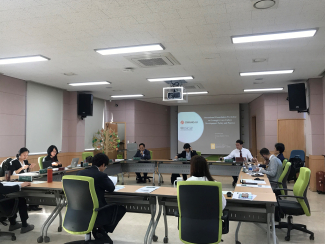International Consultation Workshop on Gwangju’s Low Carbon Development: Policy and Practice

In connection with the NEA-LCCP initiative, ESCAP East and North-East Asia Office (ESCAP-ENEA) in collaboration with Gwangju Metropolitan government organized a half-day consultation workshop, focusing on cities’ policies and initiatives that were effective in reducing carbon emissions.
In the Republic of Korea, the Framework Act on Low Carbon, Green Growth enacted in January 2010 provides the legal basis for implementing policy measures that address climate change and energy issues and promote low carbon development
Gwangju is one of the metropolitan cities in the Republic of Korea with population of more than 1.5 million. Since the City signed the Agreement on the Climate Change Model City with the Ministry of Environment in 2008, Gwangju city has pioneered low carbon policies and practices. Gwangju developed a GHG inventory tool named GHG Projection and Diagnostics Program (GPD) integrating sectoral inventory, emission parameters, emission calculation and estimation formula. Later the GPD was strengthened further to integrate a GIS based policy making tool named the Urban Carbon Management System (UCMS) for municipal planning of buildings, urban transport and green space infrastructure. UCMS allows the local government to adopt a science-based climate change policy development.
Gwangju also introduced the Carbon Bank Programme in 2008, which provided subscribers with carbon points to promote low carbon lifestyle in consumption of energy and water services. Based on the experiment of Gwangju carbon credit system, the Ministry of Environment set a nationwide carbon credit system in 2014, which has a key role in GHG reduction at individual household level.
Against this background, the workshop
- showcased key initiatives in low carbon development including UCMS and identified obstacles and challenges in low carbon practices
- received views from experts who represented iGDP, IGES and ICLEI East Asia Secretariat
- shared experience and knowledge about low carbon city development.
- Mr. Kim, Jong Hyun, Division Director, Climate Atmosphere Division, Gwangju Metropolitan City Government
- Ms. Nobuko Kajiura, Sustainable Development Officer, UN ESCAP-ENEA
- Comprehensive Review of Gwangju’s Low Carbon Strategies and Policies (institutional setting, sectoral approaches) Mr. Kim, Tae-Ho, Chief of Planning and Coordination Office, International Climate & Environment Center
-
GHG Reduction & Climate Environmental Assessment Modelling Project Mr. Oh, Byoung Chull, Manager of Climate Change Response R&D Team, International Climate & Environment Center
-
Carbon Management System Ms. Kim, Ji-Yeon, Researcher, International Climate & Environment Center
-
Open Discussion and Closing
 Back to Meetings
Back to Meetings